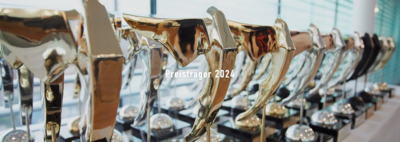Welcome at the Interface Culture program website.
Acting as creative artists and researchers, students learn how to advance the state of the art of current interface technologies and applications. Through interdisciplinary research and team work, they also develop new aspects of interface design including its cultural and social applications. The themes elaborated under the Master's programme in relation to interactive technologies include Interactive Environments, Interactive Art, Ubiquitous Computing, game design, VR and MR environments, Sound Art, Media Art, Web-Art, Software Art, HCI research and interaction design.

The Interface Culture program at the Linz University of Arts Department of Media was founded in 2004 by Christa Sommerer and Laurent Mignonneau. The program teaches students of human-machine interaction to develop innovative interfaces that harness new interface technologies at the confluence of art, research, application and design, and to investigate the cultural and social possibilities of implementing them.
The term "interface" is omnipresent nowadays. Basically, it describes an intersection or linkage between different computer systems that makes use of hardware components and software programs to enable the exchange and transmission of digital information via communications protocols.
However, an interface also describes the hook-up between human and machine, whereby the human qua user undertakes interaction as a means of operating and influencing the software and hardware components of a digital system. An interface thus enables human beings to communicate with digital technologies as well as to generate, receive and exchange data. Examples of interfaces in very widespread use are the mouse-keyboard interface and graphical user interfaces (i.e. desktop metaphors). In recent years, though, we have witnessed rapid developments in the direction of more intuitive and more seamless interface designs; the fields of research that have emerged include ubiquitous computing, intelligent environments, tangible user interfaces, auditory interfaces, VR-based and MR-based interaction, multi-modal interaction (camera-based interaction, voice-driven interaction, gesture-based interaction), robotic interfaces, natural interfaces and artistic and metaphoric interfaces.
Artists in the field of interactive art have been conducting research on human-machine interaction for a number of years now. By means of artistic, intuitive, conceptual, social and critical forms of interaction design, they have shown how digital processes can become essential elements of the artistic process.
Ars Electronica and in particular the Prix Ars Electronica's Interactive Art category launched in 1991 has had a powerful impact on this dialog and played an active role in promoting ongoing development in this field of research.
The Interface Cultures program is based upon this know-how. It is an artistic-scientific course of study to give budding media artists and media theoreticians solid training in creative and innovative interface design. Artistic design in these areas includes interactive art, netart, software art, robotic art, soundart, noiseart, games & storytelling and mobile art, as well as new hybrid fields like genetic art, bioart, spaceart and nanoart.
It is precisely this combination of technical know-how, interdisciplinary research and a creative artistic-scientific approach to a task that makes it possible to develop new, creative interfaces that engender progressive and innovative artistic-creative applications for media art, media design, media research and communication.
Preise der 31. Internationalen Wirtschaftsfilmtage 2024
FORA Film (mit u.a. Sinisa Vidovic) erhält beim GRAND PRIX bei den 31. internationalen Wirtschaftsfilmtagen in Wien insgesamt 6 Awards.
Herzliche Gratulation!
der Film „ALLE ALLE! KULTUR“ wird mit folgenden Preisen ausgezeichnet:
GRAND PRIX für den besten Film des gesamten Festivals
GOLD in der Kategorie „Tourismusfilm“
GOLD in der Kategorie „Social Media“
SILBER in der Kategorie „Marketingfilm B2C“
Kunde: Oberösterreich Tourismus
Regie: Sinisa Vidovic
Jurystatement: „Der Film ist das Herzstück einer umfangreichen Kampagne und präsentiert Oberösterreich als vielfältiges, offenes und zugängliches Kulturland. Die Jury zeigte sich begeistert von diesem mutigen Werk, das Klischees aufgreift und wohl auch durch seinen eingängigen musikalischen Charakter nachhaltig im Gedächtnis bleibt. Wir gratulieren herzlich zum verdienten Sieg!“
Der Film „DER HANNES KANN ES“ erhält SILBER in der Kategorie „HR / Employer Branding“
Kunde: Transgourmet
Agentur: vorauerfriends
Regie: Sinisa Vidovic
Der Film „ALLES FÜR DIESEN MOMENT“ erhält SILBER in der Kategorie „Imagefilme“
Kunde: Rosenbauer
Agentur: vorauerfriends
Regie: Sinisa Vidovic & Dinko Draganovic
Bei den Internationalen Wirtschaftsfilmtagen werden alle zwei Jahre die besten Produktionen aus der Unternehmens- bzw. Wirtschaftsfilmbranche im deutschsprachigen Raum ausgezeichnet. 1962 ins Leben gerufen, mit dem Ziel, die herausragende Kreativität von Filmschaffenden über Grenzen hinweg zu würdigen, kann das Festival auf eine nunmehr sechzigjährige Geschichte zurückblicken und zählt damit zu den ältesten seiner Art.
Seither bringt die Veranstaltung Vertreter aus Wirtschaft, Industrie, Tourismus, öffentlichen Stellen, der Filmbranche, der Agenturszene und der TV- und Medienbranche zusammen und bietet ihnen nicht nur eine hervorragende Dialogplattform, sondern auch die Möglichkeit, ihre besten audiovisuellen Produktionen in den Wettbewerb um die renommierten Victoria-Trophäen zu schicken und als Preisträger auf internationalem Niveau gewürdigt zu werden.
